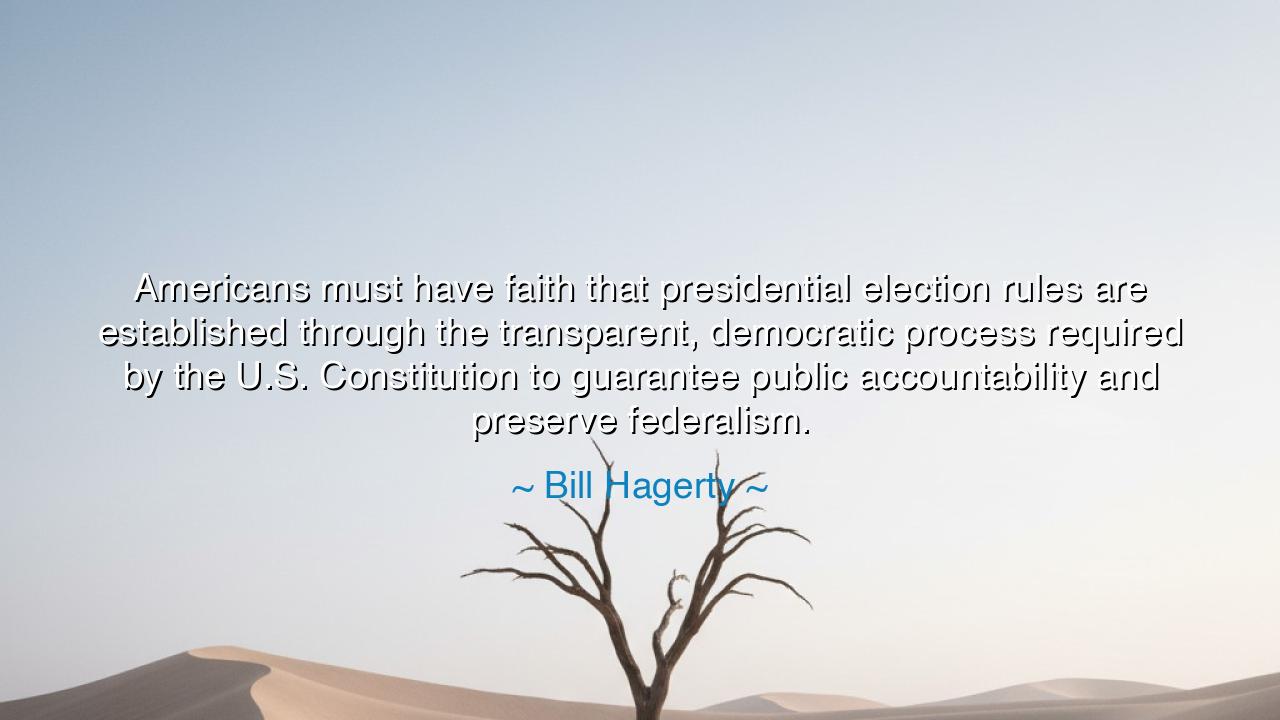
Americans must have faith that presidential election rules are
Americans must have faith that presidential election rules are established through the transparent, democratic process required by the U.S. Constitution to guarantee public accountability and preserve federalism.






Host: The quiet of the evening settled into the room, as Jack sat at the table, his fingers resting lightly on his cup, considering Bill Hagerty's words. Jeeny stood near the window, her gaze directed outward, reflecting on the deeper meaning behind the statement.
Jeeny: “I’ve been thinking about what Bill Hagerty said: ‘Americans must have faith that presidential election rules are established through the transparent, democratic process required by the U.S. Constitution to guarantee public accountability and preserve federalism.’ It’s a call to trust in the system, isn’t it? The idea that the integrity of the election process is foundational to preserving democracy and the principles of accountability and federalism.”
Jack: “Yes, exactly. Hagerty is emphasizing that the rules governing elections, especially presidential ones, are not arbitrary—they are grounded in the U.S. Constitution. It’s a reminder that these rules are designed to be transparent, democratic, and subject to public scrutiny, ensuring that the process is fair and just. The Constitution is built to preserve the core principles of democracy, accountability, and federalism, and we must trust that these values guide the election process.”
Jeeny: “Right. And I think what Hagerty is highlighting is the importance of public faith in the system. Democracy only works when people believe in the process, when they trust that the rules are being followed and that their votes count. If there’s a lack of trust in how elections are conducted, it can undermine the foundation of the entire democratic system. Hagerty is calling for faith in that system, faith that it’s built on the principles laid out by the Constitution.”
Host: The stillness in the room deepened as they both reflected on how critical it is to maintain trust in the electoral process. Jack’s fingers rested on the table, while Jeeny’s expression softened, considering the fragile nature of public trust and the importance of transparency and accountability in ensuring the integrity of elections.
Jack: “It makes me think about how fragile that trust is. If people lose faith in the transparency and fairness of the election process, it’s not just a loss for that election—it’s a loss for democracy itself. Hagerty is reminding us that these rules are not just technicalities—they are central to public accountability and to maintaining the strength of federalism. They ensure that power is not concentrated in one place but is distributed, and that everyone has a voice.”
Jeeny: “Exactly. And what’s powerful about this is that Hagerty is also reminding us that the U.S. Constitution provides a framework for elections that we can trust. The federal system allows for checks and balances, making sure no single entity has too much control. But to uphold that system, we have to have faith in its process. That’s why transparency is so important—so that people can see that the system is working the way it’s supposed to.”
Jack: “And I think Hagerty is really urging us to remember that democracy isn’t just a set of rules—it’s a set of shared values and a belief in the system. If we lose trust in that, we lose the very thing that makes democracy work. It’s not enough for the process to be legal—it has to be visible and understood by the people for it to maintain its legitimacy.”
Jeeny: “Yes, and it’s about accountability. Hagerty is reminding us that elections are about more than just choosing a leader—they’re about ensuring that power is held by the people and that the process is accountable to them. When people believe that their voices are heard, when they trust the election process, they are more likely to participate and engage in their democracy. And that’s what preserves the system—when it’s transparent, fair, and accountable to the people.”
Host: The quiet in the room grew deeper, as they considered how important trust in the electoral system is to maintaining the core values of democracy. Bill Hagerty had shown them that the rules of presidential elections must be transparent and based on the principles of the U.S. Constitution, ensuring that the process remains accountable to the public and preserves federalism. Jack leaned back slightly in his chair, while Jeeny’s gaze turned from the window back to him, both understanding the responsibility to uphold the integrity of the election system.
Jack: “So, Hagerty is really saying that the strength of democracy depends on trust—trust that the election process is fair, transparent, and grounded in the Constitution. Without that, the system can’t function properly, and people lose faith in the very idea of democracy.”
Jeeny: “Exactly. Hagerty is emphasizing that the rules of the election must not only be legal but must be visible and understood by the people. Trust in the process is what keeps democracy alive—it’s the cornerstone of public accountability and federalism. If we want the system to work, we have to believe in it.”
Host: The evening had fully settled in, the quiet understanding between them a reminder that trust in the electoral process is vital to maintaining the strength of democracy. Bill Hagerty had reminded them that the rules guiding presidential elections must be transparent, fair, and grounded in the principles of the U.S. Constitution, ensuring accountability and preserving the values of federalism. The world outside had darkened, but inside, there was light—a recognition that democracy thrives when the people trust the process.






AAdministratorAdministrator
Welcome, honored guests. Please leave a comment, we will respond soon